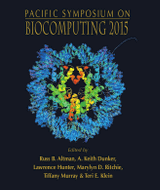
David J. Odgers1, Rave Harpaz1, Alison Callahan1, Gregor Stiglic2, Nigam H. Shah1
1Center for Biomedical Informatics, Stanford University
2Faculty of Health Sciences, University of Maribor
Email: djodgers@stanford.edu, rharpaz@stanford.edu, alison.callahan@stanford.edu, gregor.stiglic@um.si, nigam@stanford.edu
Pacific Symposium on Biocomputing 20:306-317(2015)
Post-market drug safety surveillance is hugely important and is a significant challenge despite the existence of adverse event (AE) reporting systems. Here we describe a preliminary analysis of search logs from healthcare professionals as a source for detecting adverse drug events. We annotate search log query terms with biomedical terminologies for drugs and events, and then perform a statistical analysis to identify associations among drugs and events within search sessions. We evaluate our approach using two different types of reference standards consisting of known adverse drug events (ADEs) and negative controls. Our approach achieves a discrimination accuracy of 0.85 in terms of the area under the receiver operator curve (AUC) for the reference set of well-established ADEs and an AUC of 0.68 for the reference set of recently labeled ADEs. We also find that the majority of associations in the reference sets have support in the search log data. Despite these promising results additional research is required to better understand users’ search behavior, biasing factors, and the overall utility of analyzing healthcare professional search logs for drug safety surveillance.